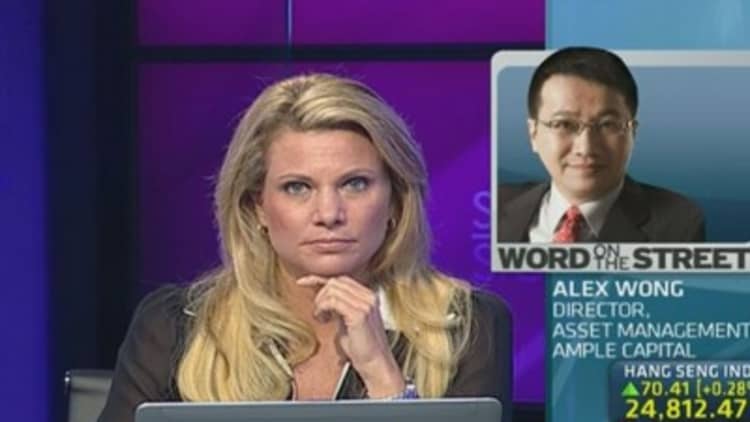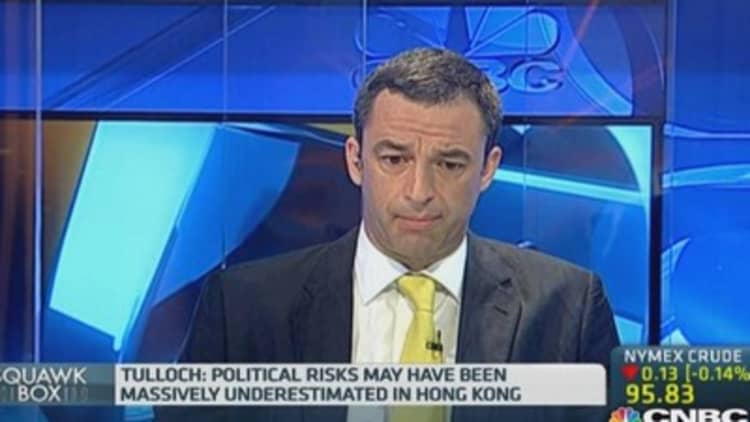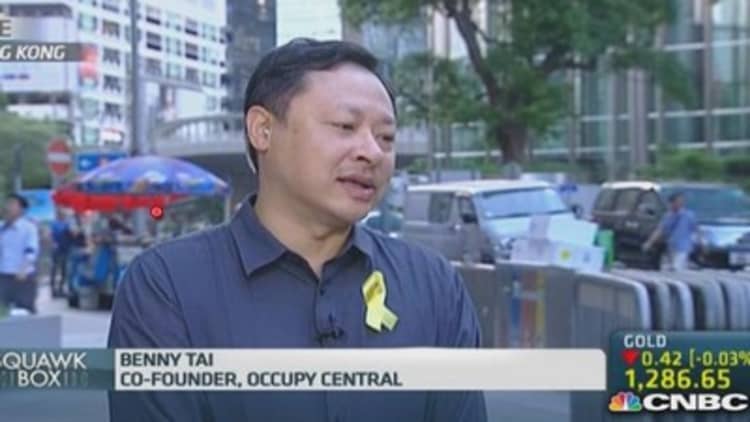Hong Kong is bracing for pro-democracy protests after Beijing slammed the door on electoral reforms on Sunday, fanning fears of potential economic fallout in the Asian financial hub.
Following a week-long general meeting, the Standing Committee of China's National People's Congress announced on Sunday that it will only allow two or three candidates with majority backing from a nominating committee to run in Hong Kong's 2017 leadership vote.
Calling the decision "the darkest day in Hong Kong's democratic history", Benny Tai, Co-founder of Occupy Central, told CNCB that the pro-democracy movement will retaliate with a series of protests.

Worries overblown or justified?
Hong Kong could face a "financial and economic storm" if political instability breaks out, the city's Financial Secretary John Tsang wrote in his blog last month, echoing key office holders in China and Hong Kong as activists threaten to stage a massive sit-in in the financial district.
However, analysts told CNBC that fears of an economic storm are overblown.
Read MoreHK Liberal Party: Hong Kong needs to be realistic
Fan Cheuk Wan, Chief Investment Officer Asia Pacific, Credit Suisse Private Banking and Wealth Management, told CNBC: "Hong Kong's pro-democracy activists have a long history of driving action using peaceful means so this will not trigger major risk factors."
"Most importantly, Beijing's stand continues to focus on pro-business and economic prosperity and there are no signs that Beijing will reverse supportive policies," she added.
Read MoreChina warns foreign powers not to use Hong Kong as a 'bridgehead'
Pro-democracy protests are also unlikely to derail the city's financial markets, according to Alex Wong, Director of Asset Management at Ample Capital.
"So far markets have disregarded [Occupy Central]. Overnight we had a protest but the turnout was disappointing. We think the scale [of future protests] will be lesser than expected. That's why market response will stay muted," said Wong, referring to a protest on Sunday night.
The index closed 0.1 higher on Monday.

To be sure, some analysts are less optimistic.
With the mainland unlikely to accede to activists' demands, Gillem Tulloch, Founder of GMT Research, fears that any escalation in protests will hurt Hong Kong's pro-business environment.
"Political risks have long been underestimated in Hong Kong. If [the situation] continues or deteriorates, it will put off businesses and undermine Hong Kong's fundamentals," Tulloch said.
Read MoreWill 'OccupyCentral' hurt Hong Kong?
"The issue is getting very uncertain. Many protests in the past have been peaceful and I believe this one will be non-violent as well, but there may be complications. There's a possibility of a crackdown [for] it seems that Beijing will be tough when dealing with these democrats," Daiwa Capital Markets senior economist Kevin Lai said.
"This problem will go on and no one will benefit. It'll be a lose-lose situation, together with how Hong Kong's tourism and retail sales have been hit by China's anti-graft campaign," Lai added.
Declining retail sales have dogged Hong Kong for most of 2014 on the back of a sharp drop in spending by Chinese tourists who accounted for around three-quarters the city's visitors last year. The decline dragged the economy with growth slowing to a two-year low of 1.8 percent on-year in the second quarter from 2.6 percent in the first quarter.
Read MoreHongKong at risk oflosing retail rent crown
Peaceful protests?
Hong Kong, a former British colony, returned to Chinese rule on July 1, 1997, under the formula of "One Country, Two systems" which promises the city wide-ranging autonomy. But tensions between the city of 7 million and the mainland escalated in recent months.
Despite attracting 800,000 people in an unofficial referendum in June, Occupy Central is failing to convince most of Hong Kong's middle class amid concerns about antagonizing China and disrupting business.
"To be honest, I feel that the majority of the Hong Kong people don't really care about [these protests] except that they are causing disruptions," 30-year-old sales executive Mr Leung told CNBC. "Going to work has been a hassle when these protests take place."
Read MoreSenior Chinese official in Hong Kong to defend ruling

Speaking on CNBC's "Asia Squawk Box" on Monday, Occupy Central's Tai said his campaign is peaceful and does not aim to stall the financial hub.
"The purpose of the civil disobedience is not to paralyze the city," he said. "It's a process for Hong Kong people to express their commitment to democracy."
Protests haven't been completely peaceful however. Li Fei, a member of the top committee of China's parliament was heckled by activists when defending the mainland's decision on Monday. Veteran lawmaker Leung Kwok-hung, joined by a dozen pro-democracy lawmakers, chanted: "The central government broke its promise, shameless."

